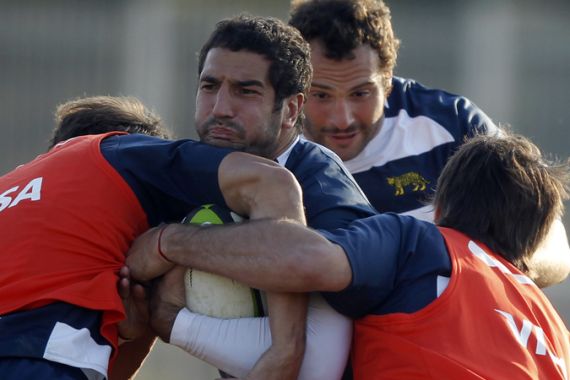Argentina join rugby’s Tri-Nations elite
South America’s most successful rugby nation prepares for a long-awaited debut in the new Rugby Championship.

The closing ceremony of London 2012 brought with it an exciting new adventure for Brazil with the handover to Rio 2016.
South American sport is gaining new exposure and increased opportunity as Brazil’s neighbors Argentina sail into unchartered waters by taking part in the first ever Rugby Championship tournament on Saturday.
Buenos Aries became a venue for a leg of the IRB seven-a-side competition and it was an instant success. There is a love for the game there with a huge following and playing base.
The new tournament replaces the old Tri-Nations, contested between rugby union’s three most successful teams ever in last year’s world cup winners New Zealand, South Africa and Australia. Argentina’s inclusion comes as the International Rugby Board seeks to broaden the boundaries of the game and also recognises the huge steps Argentina has taken as a rugby nation over the last decade.
Rising talent
The catalyst for the inclusion of Los Pumas in this annual tournament came when they finished third at the World Cup of 2007 in France – where they defeated the much-fancied hosts twice!
However, Argentina still suffered from a lack of continuity in playing time. They played a handful of tour matches every autumn, usually against weaker sides and subsequently European clubs were reluctant to let their star Argentineans play for them.
Consequently it was a unanimous opinion that this team needed a chance to compete regularly against the best sides in order to improve further.
Despite a thriving playing base in Argentina, the country’s leagues are still amateur. However, such is their natural playing talent that many of the players get snapped up on professional contracts in Europe and play for top clubs in England and France.
Argentina Coach Santiago Phelan this week announced the first ever Rugby Championship match day squad and well over half the players are based in Europe and have previous world cup experience.
With players such as Juan Martin Hernandez (fly half), Rodrigo Roncero (prop) earning his 50th Test cap and captain Juan Martin Fernández Lobbe (number eight), Phelan has some enviable talent at his disposal. Combining this experience with the finishing power they have in wings Gonzalo Camacho and Horacio Agulla (who both play their rugby in England) and this is a team who should be capable of playing expansive rugby and scoring tries.
This core of senior players will have to guide their younger colleagues through the tough encounter at Newlands Stadium in Cape Town, a venue with a favorable record for South Africa.
Despite an experienced team full of Heineken Cup (Europe’s premier club competition) veterans, they will be given a stern first test against 2007 World Cup winners South Africa.
Baptism of fire
Phelan and the Argentina supporters must be realistic with their expectations and be prepared to take some beatings in their first few outings and probably their first few years in the competition whilst they adjust to life in the big leagues.
However Argentina is a notoriously hostile environment for any touring side and they have consistently taken the scalps of some good teams there with their strong forward play. They must use this advantage; aim to win their home games and progress from there.
Despite the fact that Argentina will struggle in what many consider the most intense rugby competition in the world, there is no doubt that Los Pumas and rugby as a whole will benefit from the permanent inclusion of some South American flair into the calendar.
Andrew Binner is a freelance journalist contributing to Al Jazeera. Follow him on Twitter @AndrewBinner and www.andrewbinner.com
Al Jazeera is not responsible for the content of external websites.